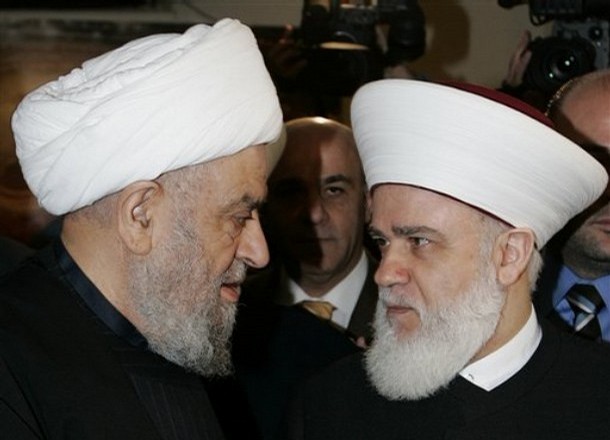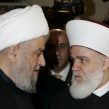
Attempt on the Life of Lebanon’s Grand Mufti Marks the Return of Salafi-Jihadi Operations to Lebanon
Publication: Terrorism Monitor Volume: 7 Issue: 30
By:

Reports emerged on September 21 that Lebanon’s Forces de Sécurité Intérieure (FSI) had been placed on high alert in Beirut following the discovery of an alleged plot to assassinate Lebanon’s most prominent Sunni cleric, Grand Mufti Shaykh Muhammad Rashid Qabbani (al-Anba’a [Kuwait], September 21). According to a security source, the plan was to kill the Grand Mufti by way of a suicide bombing inside the Muhammad al-Amin mosque in downtown Beirut (Daily Star [Beirut], September 22; September 23).
Born in 1942, Qabbani became acting Mufti after the unsolved assassination of Mufti Hassan Khalid by a car bomb in 1989. He was formally elected as Grand Mufti in 1996. Shaykh Qabbani is the highest religious authority for Lebanon’s Sunni Muslims.
Grand Mufti Qabbani initially downplayed the gravity of the plot, saying that reports of the threat were "within the framework of efforts to disrupt political and constitutional functions in Lebanon.” The Mufti added that the publication of such reports was aimed at "spreading fear among the citizens, as well as destabilizing security and stability in Lebanon" (al-Nahar [Beirut], September 22). The Mufti later spoke in vague terms about the alleged plot, saying, “We are not a source of information. The state and its security services are the ones who control the country’s security, safety and stability.” Regarding his own safety, Mufti Qabbani quoted the Quran: “Nothing will happen to us except what Allah has decreed for us” (al-Anba’a, September 23).
Despite the Mufti’s remarks, Lebanese politicians and religious leaders such as Maronite Patriarch Nasrallah Boutros Sfayr strongly condemned the alleged plot (iloubnan.info, September 22). On September 22, the Mufti received a military delegation consisting of senior members of the army and the Lebanese intelligence security services, who were reported to have passed on details of the assassination plot to the Mufti (elnashra.com, September 22; al-Hayat, September 23). The reaction of various Lebanese leaders and security officials suggests there was indeed some substance to reports of a foiled assassination attempt.
While it is impossible at this stage to confirm who stands behind the alleged assassination attempt, early indications appear to show that Lebanon’s Salafi-Jihadi movement could be involved. A website belonging to Michel Aoun’s Free Patriotic Movement quoted a Murr TV broadcast (MTV – a Lebanese satellite channel) in which security sources revealed there are two accounts regarding the alleged attempt to assassinate the Grand Mufti. The first concerns individuals belonging to al-Qaeda who arrived in Beirut from the Rashidiya refugee camp (south of Tyre) wearing explosive belts. The story claimed that one of them was arrested and the security forces are searching for the other operative. The second account refers to a group that came from the northern border region of Lebanon. An individual belonging to this group was arrested and the search is underway for others. Sources quoted by MTV believe that the first account is the most accurate (Tayyar.org, September 26).
The report on the attempt on the Mufti’s life coincided with another report which states that terrorist cells within Lebanon are flourishing. Members of Fatah al-Islam were reportedly infiltrating several Palestinian refugee camps within Lebanon with a view to carry out attacks on peacekeepers belonging to the United Nations Interim Force in Lebanon (UNIFIL), as well as various Palestinian and Lebanese officials (Al-Rai [Kuwait], September 23; Daily Star, September 23).
If the link between the attempt on the Mufti’s life and al-Qaeda affiliated groups like Fatah al-Islam is confirmed, it illustrates two developments regarding such groups on both local and international levels; on the local Lebanese level it suggests that Fatah al-Islam continues to operate in Lebanon two years after their defeat, following a three month siege by the Lebanese Forces at the Nahr al-Barid Palestinian refugee camp. Al-Qaeda and Fatah al-Islam sympathizers are in opposition to Mufti Qabbani and accuse him of “justifying” the fight against them and issuing a fatwa (religious ruling) that permitted the demolition of their mosques. [1]
During the clashes between the Lebanese army and Fatah al-Islam in June 2007, Mufti Qabbani issued a statement condemning the “Absi group” (referring to Fatah al-Islam leader Shakir Yusuf al-Absi), warning them against using mosques as shelters and holding them responsible for any damage caused to the mosques as a result (Al-Sharq al-Awsat, June 14, 2007; see also Terrorism Monitor, March 26). A year later, the Mufti condemned Fatah al-Islam attacks on the Lebanese Forces in northern Lebanon (Ya Libnan, June 1, 2008). Salafi-Jihadi poet Abu al-Qa’aqa’a al-Qurayshi, whose poems are widely circulated on jihadi web forums, even wrote a poem entitled “Advocating Fatsh al-Islam and Exposing those Midgets Who Hate It,” in which several lines were used to criticize and threaten Grand Mufti Qabbani. [2]
On the international level, it is worth noting that the plot was reported a few weeks after an al-Qaeda attempt to assassinate Saudi Prince Muhammad bin Nayif by suicide bomb, the same tactic that was to be used against the Grand Mufti of Lebanon (see Terrorism Monitor, September 17). This suggests that targeted assassinations of leading personalities in the Islamic world using suicide bombers could become the favored pattern of al-Qaeda and Salafi-Jihadi operations.
Notes:
1. See the discussion at: https://www.aljazeeratalk.net/forum/showthread.php?t=90750.
2. See: https://alflojaweb.com/vb/showthread.php?p=73023, June 5, 2007.





